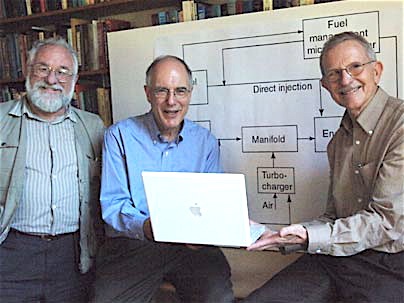The little engine that could
MIT researchers are developing a half-sized
gasoline engine that performs like its full-sized cousin but offers fuel
efficiency approaching that of today’s hybrid engine system–at a far
lower cost. The key? Carefully controlled injection of ethanol, an increasingly
common biofuel, directly into the engine’s cylinders when there’s a
hill to be climbed or a car to be passed.

Always good to see my generation of geeks are still at it!
MIT researchers are developing a half-sized gasoline engine that performs like its full-sized cousin but offers fuel efficiency approaching that of today’s hybrid engine system–at a far lower cost. The key? Carefully controlled injection of ethanol, an increasingly common biofuel, directly into the engine’s cylinders when there’s a hill to be climbed or a car to be passed.
These small engines could be on the market within five years, and consumers should find them appealing: By spending about an extra $1,000 and adding a couple of gallons of ethanol every few months, they will have an engine that can go as much as 30 percent farther on a gallon of fuel than an ordinary engine. Moreover, the little engine provides high performance without the use of high-octane gasoline.
Given the short fuel-savings payback time–three to four years at present U.S. gasoline prices–the researchers believe that their “ethanol-boosted” turbo engine has real potential for widespread adoption. The impact on U.S. oil consumption could be substantial.
For decades, efforts to improve the efficiency of the conventional spark-ignition (SI) gasoline engine have been stymied by a barrier known as the “knock limit”: Changes that would have made the engine far more efficient would have caused knock–spontaneous combustion that makes a metallic clanging noise and can damage the engine. Now, using sophisticated computer simulations, the MIT team has found a way to use ethanol to suppress spontaneous combustion and essentially remove the knock limit.
But designing an efficient engine isn’t enough. “To actually affect oil consumption, we need to have people want to buy our engine,” said Cohn, “so our work also emphasizes keeping down the added cost and minimizing any inconvenience to the driver.”
Nice to hear from researchers who realize the limitations of the market they confront. Read the details!
Sensible enough that I’m surprised they acquired support from an American car manufacturer [Ford].
Posted: Mon - October 30, 2006 at 10:57 AM